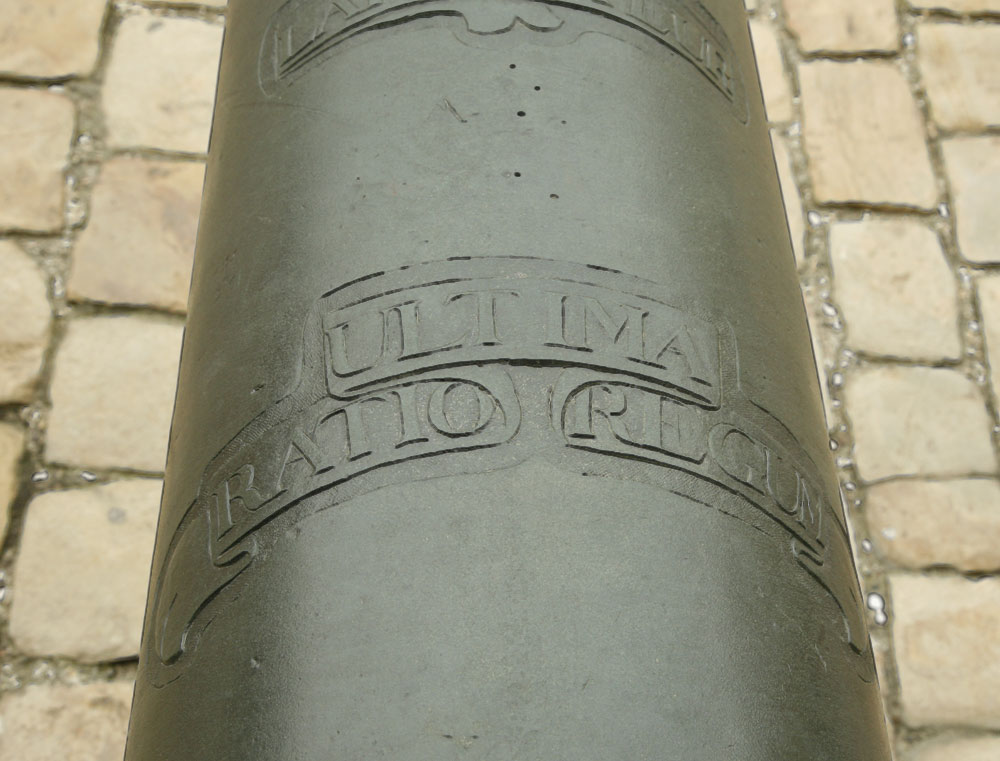The story is that Louis XIV had 16-lb’er cannon cast with the words “Ultima Ratio Regum” in the decoration.
That translates to “the final argument of kings”

mjr, 2008
The story is true; I grew up playing around the darned things. Musee Des Invalides, in Paris.

Ultima Ratio Regum may as well be the new motto of the States.
Caine@#1:
“Ratio” sounds too close to “Rational”
Perhaps “Ultima Irrational Regus” (cartomancer will no doubt cringe) – “the final irrational king”
Gnnn! You were right!
cough, cough (ultimus rex irrationalis) cough…
I guess this means they’ve run out of other arguments.
multitool@#4:
I guess this means they’ve run out of other arguments.
Do you see “diplomacy” carved onto that gun barrel? I sure don’t.
cartomancer@#3:
Thank you!!!
Look for my new text on “how to troll for classicists” – coming soon on amazon kindle.
There should be priestly entrails somewhere in the argument.
It’s in several of Pratchett’s books: The trouble with kings is that when you say “you and what army?” they usually can point to one.
chigau@#7:
I approve. Perhaps swab the cannon barrel down with the entrails of a priest after each shot. To keep it cool.
Mine’s in preprint! Or whatever the term of art is.
And when they made a bigger gun:
Ultimus Caesar rationis (Non sum Rex, sum Caesar)
Errm, because it’s the source of the word….Or did I miss the joke?
D’oh!
Ultima ratio Caesarorum or something.
Sorry Carto!
As I tell my Dungeons and Dragons group: “Any Diplomacy skill check against a deceased opponent is an automatic Critical Success.”
@invivoMark
Have any of them made the opponent that those zombies are technically opponents who are deceased? (Though that actually could get kind of interesting if the undead actually always did what they were told by the living. Zombies as a natural resource until someone locks them into a command by plugging or destroying their ears…)
Brian, #11
I’m not going to rise to that. You can correct your own Latin third declension genitive plurals from now on.
If you need me I’ll be over here re-grouting the opus incertum on my shrine to Mary Beard.
Caesar isn’t 1st declension? I thought it was like Ager which has gen. pl. of agrorum.
So, it’s Caesarum or something banal?
The third declension starts off so promisingly, then really underwhelms in the plural.
I mean, Agrorum is a step up from Agri.
So, in the third it should also step up in the plural, Caesarorum would do it.
Or don’t natural languages care for my aesthetics?
Opus incertum? Untrue work? Uncertain work? You’re trying to make me research Mr. Classics Teacher. No fair.
I like Mary Beard’s shows, at least the ones I’ve seen on youtube.
She explained how a baker, who’d paid for a flash tomb on some public way, has used the apparavit!, and explained how it was meant as a joke for ‘get it!’
That kind of enthusiasm for the language and the Romans who used it is infectious.
Gilliell@#8:
The trouble with kings is that when you say “you and what army?” they usually can point to one.
I haven’t read enough Pratchett to run across that one before, which made me giggle for several minutes. Thank you!
Brian, #15
Yes, it’s 3rd declension. Possibly from the very rare early Latin caesaries (5th declension) meaning long haired. The Equites Caesaris were a battallion of Roman cavalry under the principate, and his daughter was known as Julia Caesaris.
Opus Incertum means “irregular work”. It was kind of like crazy paving but on walls – irregular pieces of stone set in cement as a decorative cladding for a building. It was popular in the late Republic.
And it’s “apparet” rather than “apparavit” on the tomb of Gaius Eurysaces (present tense, not perfect), but close enough! And speaking of bakers I’m still waiting for the BBC to replace Mary Berry with Mary Beard for the Great Roman Bake-Off. That would be much better.
cartomancer@#17:
Opus Incertum means “irregular work”. It was kind of like crazy paving but on walls – irregular pieces of stone set in cement as a decorative cladding for a building.
Just wait ’till CIA hears that one. I can totally see them starting a Department of Opus Incertum.
Apparet, apparivt. Got it, get it, whatever. ;)
Just kidding I remembered wrong, and as I suffer from the affliction of chronic laziness, I didn’t go and look it up before posting.
IVLIA CAESARIS, FILIA ILLIVS MAGNI IVLII. Julia of Caesar.
So, you don’t subscribe to the story that an ancestor of Caesar was born by caesarean?
Damn you Wikipedia, you should know better!
Technically, an “argument” that relies on the threat or use of violence is a fallacy ad baculum. Ultima Fallacia Regum?
Hey, there’s a Latin Wikipedia, with an entry for Canno:
Owlmirror @ 20. Cool, the declination of cannon is canno, cannonis, etc…
There’s a latin Wikipedia? Of course there is, it’s the internet… I should have realized..